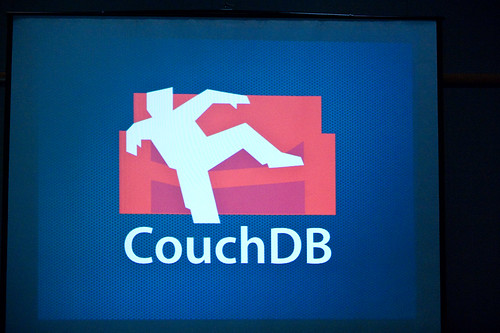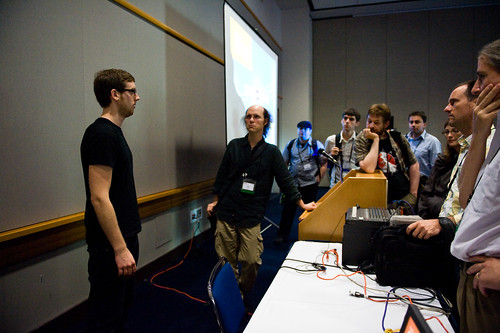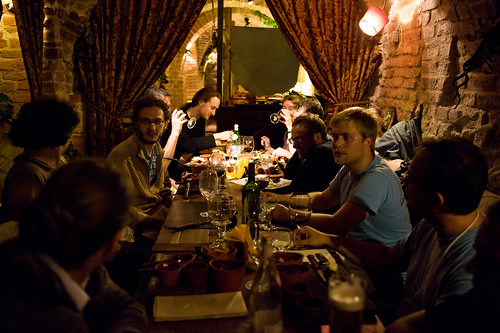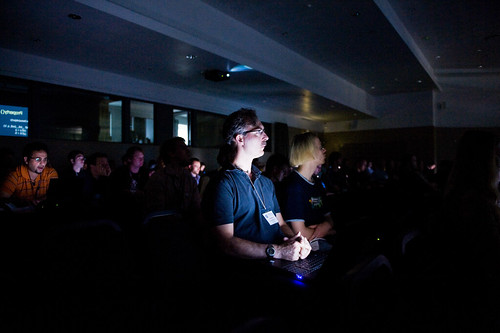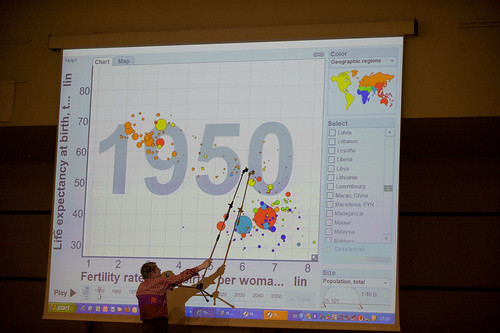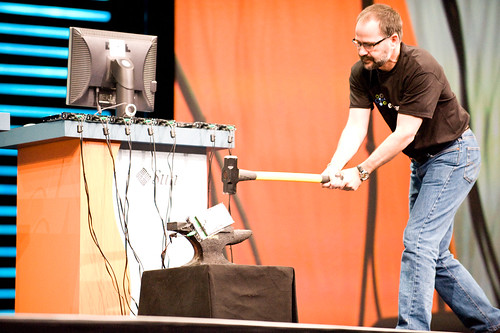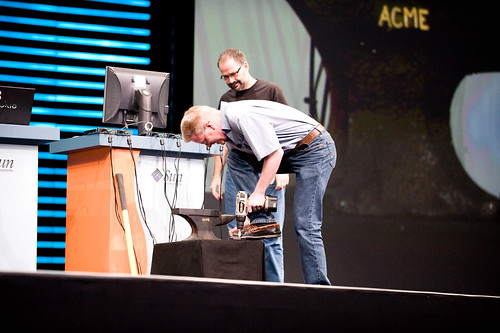Another OSCON has come and gone, and as usual, I am exhausted in the aftermath. I’ve developed a love-hate relationship with OSCON over the years. The diversity of the OSCON community is one of the huge pluses of the conference. I got involved in open source via Apache, and OSCON was where I really started to get more of a sense of the open source community as a whole. That’s led to friendships with people doing all sorts of open source stuff, which makes the conference a natural place to reconnect with many of those folks. Which leads to the primary downside of OSCON, which is that there is just no way to keep up with, never mind see all the people that you’d like to see. Combine that with the sheer scale of the event, and you have recipe for burnout. This year is no exception, which is why this post is delayed by a few days.
Languages
It’s fitting to start a review of OSCON with programming languages, since OSCON began as a Perl conference. There are still lots of Perl hackers running around, and by the distribution of the program (the Python track was 1 day shorter than the Perl, PHP, and Ruby tracks), it seems that Perl is not going anywhere anytime soon. I think that we are going to need to drum up some more Python talks for OSCON next year. Then again, with PyCon topping 1000 people this year, maybe all the Python folks are going there. It certainly is cheaper than going to OSCON. Despite all of this, I saw lots of people that I knew from the Python community, as well as plenty of people who had affixed a yellow Python ribbon to their badge. The ribbons are a nice way of helping people find their tribe at a big show like OSCON – a lower tech version of what the Pathable folks are doing.
I spent a lot of time nosing around various concurrency oriented sessions. I attended Steven Parkes’ tutorial on Actors, which was pretty well attended. Steven has implemented a version of Actors as a set of Ruby and Python libraries. During the tutorial I was able to meet Debasish Ghosh, who has a great blog and Twitterstream on high-level languages, and concurrency topics in general. I also took in a BOF on Actors, which had some really interesting conversation. There were a lot of Erlang folks in the room for that one, which made the discussion pretty interesting.
Databases
There was lots of non-traditional database stuff happening at OSCON this year. I am one of the mentors for the CouchDB project at Apache, and I was finally able to meet my first CouchDB commiter, Jan Lehnardt, at the show. Jan gave a nice high level overview talk on CouchDB, which was well attended, and I was interested to see Brian Aker of MySQL/Drizzle in the audience and among the throng of questioners after the talk.
I also went to a talk on Prophet, which is a peer to peer database that is being done by some of the folks that brought us SVK. I’m not sure that I quite recovered from my initial reaction to that revelation, but Jan was sitting next to me during the entire talk, and was saying something about stealing some ideas from the Prophet guys. In open source we call that standing on the shoulders of giants, or something like that.
“Memes”
The XMPP folks had a three day summit during the conference, which I gather was well attended. There was a decent amount of XMPP buzz floating around in the hallways, so I expect the blogosphere to be full of XMPPness during the next week or so. I’ve done a bunch of blogging on XMPP in the past, and while things have improved, they haven’t improved to the point where XMPP is taking over the world. Things like Twitter are definitely helping, but there is still a long way to go before XMPP achieves world domination. But we can hope. And at least XMPP makes a great advertisement for Erlang.
Along with XMPP, we had the microblogging meme. I made heavy use of Twitter throughout the week, and it definitely played a useful part in making connections with people. Well, except for the times when it was down. I was able to spend a little time with Leah Culver, the founder of Pownce, which has the virtue of being written in Python, and of having a very nice API for dealing with the service. It’s interesting to get additional perspectives on a problem, and since I had already talked some with the Twitter guys, it definitely helped to hear Leah describe Powce’s take on the problem(s) and solutions. O’Reilly was not to be outdone, and did some very active boostering for identi.ca. I’ve got very mixed feelings on identi.ca. One the one hand, I should love identi.ca, because it’s open source. On the other hand, it’s written in PHP, which means I won’t be touching the code, and more importantly, my network is not there. Actually, it was kind of annoying to have to explain to lots of identi.ca zealots that it’s the network that’s the value, not the software, or ironically, the quality of the service. Still if another microblogging service can convince my network to move, and remain up, and even deliver some new functionality, I would definitely switch. I think I could probably write another post about “microblogging”, but I’ll refrain for now.
Theo Schlossnagle gave an amazing presentation called “Full-stack introspection crash course”, which is code for “let me show you some amazing stuff that you’ll only be able to do with DTrace”. This was a brilliant choice of title on Theo’s part, because it didn’t scare away all of those people whose preconceptions about DTrace or Sun would prevent them from coming to such a talk. Instead, Theo played to a very full room, and I would say that about one-third of the audience actually uttered the phrase “Oh My God” out loud at some point during the presentation. This was certainly true for thetwo gentlemen sitting directly to my right and directly behind me. I later heard from people at the Sun booth, that a bunch of people came to the booth having heard about DTrace (I assume at Theo’s talk), asking for whatever CD’s they needed in order to be able to use it. Theo clearly understands how to communicate about DTrace. We at Sun need to learn that lesson.
Open Source
Of course, you can’t have a conference on open source without meta stuff about open source itself. I was fortunate to attend the morning session of Microsoft’s Participate08 event, which was an interesting case study led by Karim Lakhani from the Harvard Business School. The case was on threadless.com and involved a lot of issues which are very relevant to injecting corporate involvement into an existing community based organization. I’ve been following Karim’s work over the years (he studied under Eric von Hippel, whose work I am also fond of), so I was happy for the chance to meet him and participate in an activity with him. I also met Siobhan O’Mahony, who is also doing great work studying open source communities. I’m not sure what direct value Microsoft got out of sponsoring Participate, other than being able to say that they did an event around OSCON, but I know that I definitely appreciated the chance to interact with a bunch of people.
Microsoft was all over the news by the end of OSCON, having announced that they would become a Platinum sponsor of the Apache Software Foundation. This was not a complete surprise to me: Justin Erenkrantz, the current ASF president told me what was happening the night before at a party. I think that this is an interesting step for Microsoft, an it’s definitely a step in the right direction. However, as one questioner pointed out, Microsoft has a long history of incendiary rhetoric towards the open source community, and that’s going to mean that just about everything happens in steps. I do find it interesting that one of the reasons that the ASF has taken donations is to build up a legal defense fund against what we regarded as inevitable legal attacks. It’s somehow ironic to think of Microsoft’s $100,000 going into that pool. I think that the next interesting milestone in Microsoft’s relationship with the ASF will be when the first Microsoft sponsored project shows up at the front door of the Apache Incubator.
I also contributed to the metaness with a talk titled “Open Source Community Antipatterns” (slides are now available on the O’Reilly slide page). The talk was decently attended, but I suspect that the all-star antipatterns panel immediately following my talk drew off some of the audience that might have come to my talk. The people track expanded a great deal this year, which I think is a good thing.
Photography
I always have photographic memories associated with OSCON. I got my first digital SLR, right before OSCON 2005, and I’ve shot a bit a each OSCON, and even won the OSCON photo contest one year. This year I found myself shooting less. There were too many other things that I needed to do, and between knowing that Duncan is making is covering stuff and some artistic blockage, I lacked both time and motivation to crank out the shots.
Duncan has been a great friend and photographic mentor, and I always look forward to catching up with him during OSCON. This time was no exception. We did a bunch of stuff together, ranging from hanging out, having a wide angle shootout (well he was wide) to Duncan putting one of his cards into my D3 and giving the pixels a once over. Probably the most fun thing that we did was an impromptu photoshoot. Duncan was shooting headshots of the OSCON staff for a thank you slide for the closing keynotes. Only problem was that he needed one of himself, so he drafted me. With the safe shot in hand, we spent a few more minutes doing something a little edgier and fun.
Fin
That’s it for another OSCON. I hope we’ll be back in Portland again next year.
